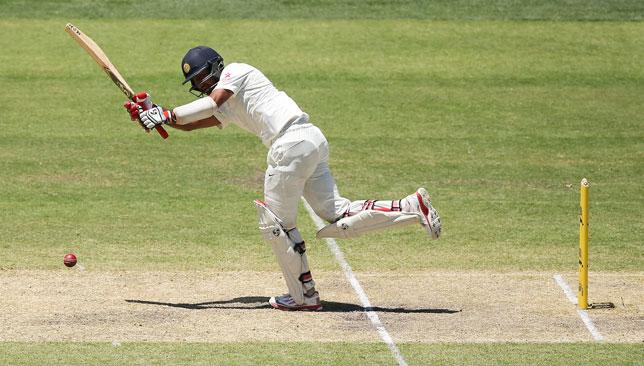
The tour of Bangladesh marks the beginning of a new era in Test cricket for India. The current Test squad is now officially skipper Virat Kohli’s squad, and if a side’s attitude is said to reflect that of the captain it plays for — which it often does — the cricket-obsessed nation can expect to see a fearless, exciting brand of cricket being played.
– BANvIND: Second day of Test entirely washed out
– Sangakkara to Kohli: Top-ten best Test batsmen
– England: Jos Buttler keen to follow de Villiers’ lead
– IPL: KKR owner Shah Rukh Khan buys CPLT20 team
The one-off Test at Fatullah offers Kohli his first opportunity to begin carving the team’s ethos in his own image. And he has already signaled his intentions, leaving out Cheteshwar Pujara for Rohit Sharma, and preferring the speed of Varun Aaron to the guile of Bhuvneshwar Kumar.
In a recent interview with ESPNCricinfo, Kohli presented a lucid view of his plans: Play aggressively, risk defeat in order to win and aim to play positively with the bat by scoring “150-plus runs in a session”. According to Kohli, his dream is to see India dominate world cricket for the next five years. Along the way, he wants to help cultivate strong bonds between his players who “live together 250-280 days a year”, thanks to an ever increasing schedule of international cricket.
By and large, a relatively young Test roster appears to resonate with its captain’s vision. Even veteran spinner Harbhajan Singh – recalled to the side with spin options limited — has the attacking mindset to match that of Kohli’s.
While Harbhajan’s inclusion was as surprising as it was necessary, where Pujara fits into India’s future is less clear. The 27-year-old batsman stands out as the only Test ‘specialist’, having not established himself in the shorter formats, but still his place in the starting XI remains uncertain.
Cricket’s remarkable evolution over the last decade has blurred the lines between its three formats. A positive approach to batting has spilled over from Twenty20 (T20) cricket into One-Day Internationals (ODIs) and, eventually, into Tests as well. If you compare Test run-rates a decade either side of T20’s introduction you will see a remarkable 10% increase.
Good move to play 3 seamers. Against Bangladesh you want to do that. But Pujara should have played & opened instead of Dhawan.
— Sanjay Manjrekar (@sanjaymanjrekar) June 10, 2015
Faster run-scoring and heightened aggression are no longer a rare treat in Tests, they’ve become a normal necessity. Player performances in shorter formats are influencing the selections for the longer format more than ever before as specialists turn into generalists.
Kohli recognises this, which puts Pujara in an favorable position. His ODI career practically ended last year after averaging 10.20 in five innings against minnows Zimbabwe and Bangladesh. He was also released by Indian Premier League (IPL) franchise Kings XI Punjab last year, and failed to attract any bids during this year’s auction. A strike rate of below 100 in 30 IPL matches suggests why.
In an age of extravagance, Pujara resembles a technician from a bygone era who is struggling to adjust to the demands of the modern game. Worse for Pujara, if he fails to pin down a spot in the Test side, he has no other avenues on the international stage to make an impression.
He averaged a poor 22.20 over five Test matches in England, where a number three batsman’s role is vitally important in shielding the rest of the order from early movement typical of UK condition. While he fared a little better in Australia (33.50 in three Tests), Pujara was first pushed down to number six in the batting order in favour of Lokesh Rahul before being dropped altogether, in favour of Suresh Raina.
Unspectacular form and a susceptibility to short-pitched bowling were major factors to Pujara’s demise on those tours, indicators of a bleak future. Both Rohit and Raina, close companions of Kohli’s, were drafted in not only as greater aggressors, but also for continuity bearing in mind the subsequent ODI series and World Cup.
Positivity and continuity — two factors that will remain central to Team India’s plans across all formats and Pujara currently makes the grade in neither. Owing to his Test-only status, he will not be part of the squad “250-280 days” a year.
Player selection policies in Indian cricket are easily influenced by the shorter formats, as is the opinion of the public. This was evident in Harbhajan’s recall and the selection of Rohit at Fatullah, both players having played key roles in Mumbai Indians’ IPL-8 triumph.
It’s unlikely that Pujara’s English county stints (he averaged in excess of 50 at Yorkshire) will ever outdo an explosive IPL. Which begs the question: Can he really survive in the team as a one-format specialist?
Rahul’s illness and subsequent withdrawal from the Bangladesh tour seemed to have given him real hope of breaking back into the Test XI. But when Kohli chose to play five bowlers, all it did is confirm that both Rahul and Rohit were ahead of Pujara in the skipper’s thoughts.
Pujara will face a tough time in finding opportunities to prove himself again. He is no jack of all trades, but whenever he is given a chance next it will be make or break for the slight right-hander.
In a country with short cricketing memory and an, at times, unhealthy fixation on one-day cricket, Pujara is perilously close to becoming out of sight and out of minds for good.